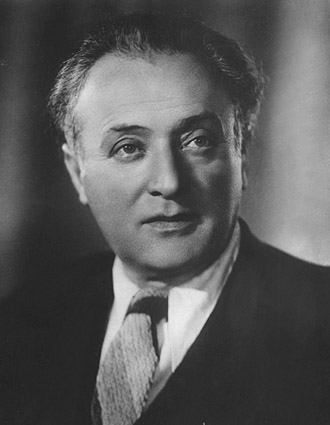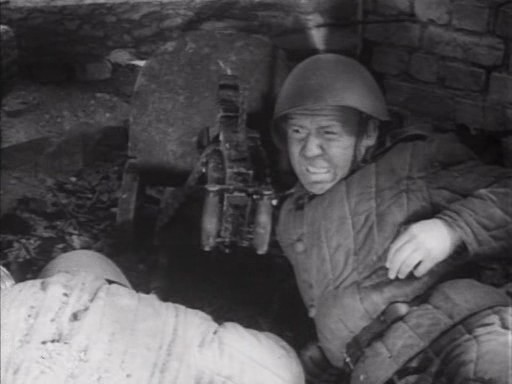Earwitness 66: ‘Everything in memory of you…’, our series about 20th-century Russian music, has arrived at ‘the turning point’ in the Great Patriotic War. The war moves over to outside the Russian borders and the Red Army moves through Poland and Belarus to German territory. The first Allies land in Normandy on 6 June 1944, who also slowly push the west front back to Germany.
Fled from Poland to Russia, in 1945 composer Mieczysław Weinberg wrote his Piano trio for the woman he recently married – Natalja Vovsi, youngest daughter of actor and director Solomon Michóels (shown in the picture with his eldest daughter Viktoria).
Then, cellist Mstislav Rostropovitsj performed a solo in the Nikolaj Mjaskovski’s Cello concert in 1944, which he dedicated to Svjatoslav Knoesjevitski. Kirill Kondrasjin conducted the Moskous Filharmonisch Orkest.
 In 1945, Gavriil Popov started the soundtrack to ‘General of the Army’, renamed ‘The big turning point’, for the sake of his friendship with director Friedrich Ermler (left picture), but while doing so the composer was swept away by the work. This film about the Battle of Stalingrad (picture below) was meant initially as a great tribute to general Zhukov. But this war hero became too much of a threat to Stalin because of his feats, and was ‘promoted away’ to Odessa. In many ways, ‘Turning point’ was one of Stalin’s favourite phrases.
In 1945, Gavriil Popov started the soundtrack to ‘General of the Army’, renamed ‘The big turning point’, for the sake of his friendship with director Friedrich Ermler (left picture), but while doing so the composer was swept away by the work. This film about the Battle of Stalingrad (picture below) was meant initially as a great tribute to general Zhukov. But this war hero became too much of a threat to Stalin because of his feats, and was ‘promoted away’ to Odessa. In many ways, ‘Turning point’ was one of Stalin’s favourite phrases.
“My fifth symphony is meant to be a hymn to the free, happy person, his great capacity and his pure, noble spirit. I cannot say that I chose this theme consciously. It came to me and screamed to be expressed. The music has matured in me and filled my soul,” said Sergei Prokofiev. It had its premiere on 13 January 1944, when the Red Army had won a decisive battle at the Vistula and moved into Germany. Prokofiev held still his baton for a moment, when heavy artillery boomed outside of the Great Hall of the Moscow Conservatory, and began the concert when everything had quieted down. In 1946, the Fifth symphony was awarded a Stalin prize, as was Piano Sonata no. 8. That year, Sergei Eisenstein received a prize for part 1 of ‘Ivan the Terrible’, with Prokofiev’s soundtrack.
1. Mieczysław[Moisje] Weinberg (1919-1996).
Pianotrio opus 24 (1945): 1) Prelude and Aria, larghetto, 2) Toccata, allegro marcato, 3) Poëem, moderato, 4) Finale, allegro moderato.
Dmitri Sitkovetski, violin. David Geringas, cello and Jasja Nemtsov, piano.
Hänssler Classic/Bayerischer Rundfunk CD 98.491.
2. Nikolaj Jakovlevitsj Mjaskovski (1881-1950).
Celloconcert in c opus 66 (1944): 1) Lento ma non troppo, 2) Allegro vivace.
Mstislav Rostropovitsj, cello. Moskous Filharmonisch Orkest led by Kirill Kondrasjin.
Brilliant Classics 92771/1. Historic Russian Archives. Mstislav Rostropovich Edition.
3. Gavriil Nikolajevitsj Popov (1904-1972).
Muziek bij Friedrich Ermlers (1898-1967) film “General of the Army” (‘The big turning point’), opus 44 (1945): 1) Theme of threat, 2) Breakthrough, 3) Minoetka’s death, 4) Silence, 5) German offensive, 6) Klaus captured, 7) Russian offensive.
Petersburgs Staatsacademisch Symfonieorkest led by Aleksandr Titov.
Northern Flowers/PMA 9977 / Wartime Music Vol. 8.
4. Sergei Sergeyevich Prokofiev (1891-1953).
Symphony no. 5 in Bes, opus 100 (1944): 1) Andante, 2) Allegro marcato, 3) Adagio, 4) Allegro giocoso.
Omroepsymfonieorkest Moskou led by Gennadi Rozjdestvenski.
Melodija MEL CD 10 01797.








